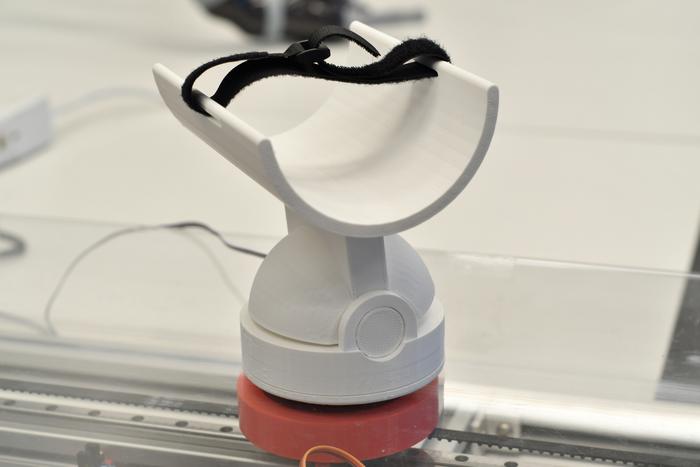New URI lab developing adaptive technology, secures National Science Foundation grant

Credit: Nora Lewis / URI
New URI lab developing adaptive technology, secures National Science Foundation grant
Reza Abiri and Yalda Shahriari receive National Science Foundation award totaling $460,000 for work to improve stroke patient rehabilitation
Passing by Reza Abiri’s office at the University of Rhode Island, one might suspect him of nursing a serious coffee habit. A colorful collection of various mugs and cups dot his office, and though he is friendly enough to likely welcome any visitors stopping by to chat, the cups serve a larger purpose.
Abiri and Yalda Shahriari, professors in URI’s College of Engineering, are building a new robotic platform that can help post-stroke patients perform needed rehabilitation and regain motor skills in the wake of a stroke, including to reach for, grasp and hold on to that all-important cup to start the day.
The new device they are building includes an adaptive closed loop that will incorporate user feedback, to engage and motivate patients to further their motor training on the way to recovery.
The robotic platform they are building will monitor the muscle and brain activity of the user in order to trigger the execution of reach and grab in an adaptive way, so that the most daily of tasks — grabbing a cup of coffee or handing a mug to a visitor to pour their own — keeps the human goal of the project front and center.
Their project, which aims to make significant strides in rehabilitation methodologies, includes a cutting-edge closed-loop feedback system and will advance the rehabilitation of upper-extremity motor functions for post-stroke patients. User-generated feedback will tailor the device to each user.
Abiri is testing some novel techniques in his work, including magnetic-based systems, which he hopes to explore further. The use for post-stroke patients could be immediate. Users will be able to more quickly recover neural plasticity, improving their brain capacity to continue growing and evolving, adapting and changing through the creation of new neurons and networks.
The user-centered robotic device can also provide occupational therapy in the patient’s own home. Having a device at home, outside of the clinical setting, would mean more integration into daily life and more physical therapy for patients.
The two are also working with Mariusz Furmanek, assistant professor of physical therapy, and consulting with stroke specialist and Massachusetts General Hospital neurologist David Lin.
In the future, the technology could be used for patients with other categories or neurological diseases.
“I’d like to see this expand to other applications,” Abiri says.
First DARE award for Reza Abiri, second DARE award for Yalda Shahriari
Abiri and Shahriari received a $460,000 award from the National Science Foundation’s Disability and Rehabilitation Engineering (DARE) program, which supports biomedical engineering research that improves the quality of life of persons with disabilities, for the exoskeleton they’ve developed. The process is competitive; only about 10 to 15 percent of applications are accepted by the DARE program.
Abiri, an assistant professor in the College of Engineering, focuses his work on biomedical robotics, artificial intelligence, mechatronics, exoskeletons and bio-signal processing. Neural activity connected to hand grasp mechanics is a particular focus. Abiri is also the director of URI’s new Translational Neurorobotics Laboratory, which focuses on biosignal control systems and medical robots with AI-enabled control strategies.
Before joining URI, Abiri worked in the field of control systems and brain-machine interfaces which benefited human patients with upper limb impairment. At URI, he is taking a system approach to build closed loop and adaptive robotic platforms to help those patients better function in their own lives. Abiri is also the director of a team developing a new certificate in wearable and neuro-technologies, slated for next year through URI Online.
The award is the second DARE award for Shahriari, who received a grant in 2019 to help patients with severe motor deficits. She’s also worked with patients with amyotrophic lateral sclerosis (ALS) in need of communication systems that can bridge the brain-computer interface.
“I always felt biomedical engineering is a tangible field that I could feel what I learn and really connect with it,” she says. “Among all parts of the body, I find the brain always fascinating; I am always enthusiastic to learn more about it.”
An interest in the brain is what drew Abiri, as well.
“The brain is the most complex system in the world,” he says. With an interest in robotics, it was natural to combine the two. Together, the burgeoning field of neurorobotics takes a systems approach to apply robotics to help patients with brain-influenced medical challenges. Such work is the foundation of the lab he directs, which can also help patients with stroke or spinal cord injuries.
The College of Engineering’s multidisciplinary nature was part of what drew Abiri to URI, he said. With so many engineering disciplines at the University, he knew he’d find the kind of environment needed for his research.
“I chose URI because of the possibility of collaboration here,” he said.



